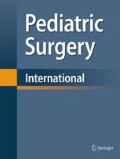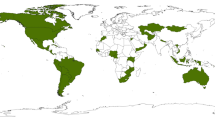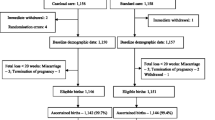Abstract
Previous studies have assessed informational needs of parents of sick fetuses, neonates and children to identify favourable patterns of physician–parent interaction. The aim of this paper was to assess parents’ informational needs before and after the operation when the one affected by a surgically correctable anomaly is a newborn. In the period ranging from 1997 to 2000 all couples with newborns undergoing major surgical procedures at birth, at the Newborn Surgery Unit of the Hospital Bambino Gesù, were surveyed by means of a questionnaire. Thirty couples form the object of the study. The two genders did not show significant difference in any of the considered items. All 30/30 mothers (M; 100%) and 29/30 fathers (F; 97%) had never heard about the anomaly before the diagnosis was established in their baby. All parents (100%) stated that it would be better if the surgeon informed them with written educational material. Principal informational needs before operation regard: the description of the anomaly (M=10; F=11) and the prognosis in terms of survival chances of the baby (M=17; F=15); after surgery the cause of the anomaly (M=5; F=3); the steps of the recovery process (M=10; F=12) as well as the quality of their baby’s life (M=9; F=9). In the immediate perioperative period the surgeon should well address parents’ informational needs, which may significantly differ from his communication plan.
Similar content being viewed by others
References
Roter DL, Hall JA, Kats NR (1987) Relations between physicians’ behaviors and analogue patients’ satisfaction, recall and impressions. Med Care 25:437–451
Hall JA, Roter DL, Ehrlich CM, Miller LH (1994) Satisfaction, gender, and communication in medical visits. Med Care 32:1216–1231
Street RL (1992) Analyzing communication in medical consultations: do behavioral measures correspond to patients’ perceptions? Med Care 30:976–988
Noll S, Spitz L, Pierro A (2001) Additional medical information: prevalence, source and benefit to parents. J Pediatr Surg 36:791–794
Perlman N, Freedman J, Abramovitch R et al (1991) Informational needs of parents of sick neonate. Pediatrics 85:512–518
Woolley H, Stein A, Baum J (1989) Imparting the diagnosis of life threatening illness in children. Br Med J 298:1623–1626
Hunfeld JA, Leurs A, De Jong M, Oberstein ML, Tibben A (1999) Prenatal consultation after a fetal anomaly scan: videotaped exploration of physician’s attitude and patient’s satisfaction. Prenat Diagn 19:1043–1047
Shellbarger S, Thompson T (1993) The critical times: meeting parental communication needs throughout the NICU experience. Neonatal Netw 12:39–41
Pain H (1999) Coping with a child with disabilities from parents’ perspective: the function of information. Child Care Health Dev 25:299–312
Levinson W, Chaumeton N (1999) Communication between surgeons and patients in routine office visits. Surgery 125:126–134
Werheimer MD, Bertman SL, Wheeler HB (1985) Ethics and communication in the surgeon–patient relationship. J Med Educ 60:804–806
Zeev NK, Shu Ming W, Caramico LA (1997) Parental desire for perioperative information and informed consent: a two-phase study. Anesth Analg 84:299–306
Starke M, Moller A (2002) Parents needs’ for knowledge concerning the medical diagnosis of their children. J Child Health Care 61:245–257
Kohler I, Gotz M, Irmgard E (1996) Parent’s recollections of the initial communication of the diagnosis of cystic fibrosis. Pediatrics 97:204–209
Myers BA (1983) The information interview. Enabling parents to hear and cope with bad news. Am J Dis Child 137:572–577
Eden OB, Black I, Mackinlay GA, Emery AE (1994) Communication with parents of children with cancer. Palliat Med 8:105–114
Caniano DA, Baylis F (1999) Ethical considerations in prenatal surgical consultation. Pediatr Surg Int 15:303–309
Statham H, Solomou W, Chitty L (2000) Prenatal diagnosis of fetal abnormality: psychological effects on women in low-risk pregnancies. Baillieres Clin Obstet Gynaecol 14:731–747
Drotar D, Baskiewica A, Irvin N et al (1975) Adaptation of parents to the birth of an infant with a congenital anomaly. Pediatrics 56:710–717
Catletta A, Miles M, Holditch-Davis D (1994) Maternal perceptions of illness severity in premature infants. Neonatal Netw 13:45–50
Pelchat D, Ricard N, Bouchard J-M, Perreault M, Saucier J-F, Bisson J (1999) Adaptation of parents in relation to their 6-month-old infant’s type of disability. Child Care Health Dev 25:377–397
Aite L, Trucchi A, Nahom A, Casaccia G, Zaccara A, Bagolan P (2004) Antenatal diagnosis of diaphragmatic hernia: parents’ emotional and cognitive reactions. J Pediatr Surg 39:174–178
Affleck G, Tennen H, Rowe J (1990) Mothers, fathers, and the crisis of newborn intensive care. Infant Ment J 11:13–25
Caplan G (1965) Four studies of crisis in parents of prematures. Commun Ment Health J 1:149–152
Author information
Authors and Affiliations
Rights and permissions
About this article
Cite this article
Aite, L., Zaccara, A., Trucchi, A. et al. Parents’ informational needs at the birth of a baby with a surgically correctable anomaly. Ped Surgery Int 22, 267–270 (2006). https://doi.org/10.1007/s00383-005-1631-2
Accepted:
Published:
Issue Date:
DOI: https://doi.org/10.1007/s00383-005-1631-2




